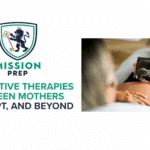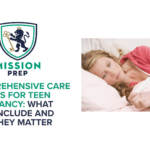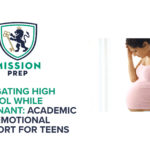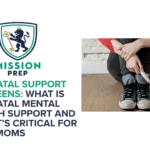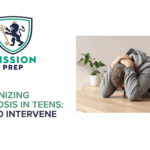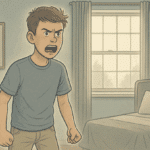Postpartum Psychosis in Teens: Symptoms and Emergency Support


Not many people consider teen moms and severe mental health crises, but when it happens, managing it can feel overwhelming. Becoming a mother as a teenager brings overwhelming change physically, emotionally, and psychologically. While some emotional ups and downs are expected after birth, postpartum psychosis in teens is a rare but severe psychiatric emergency that can develop, often emerging within two weeks of delivery.
Postpartum depression and psychosis are different because of how quick the onset of psychosis can be. If immediate care isn’t possible, the safety of the mother and child is at risk. Postpartum psychosis affects approximately 1 to 2 in every 1,000 new mothers, according to a 2023 comprehensive review on postpartum psychosis.¹
As teens are going through hormonal fluctuations, have limited social support, and are likely not getting enough sleep, they are at particular risk of postpartum psychosis. Recognizing the severity and urgency of postpartum psychosis is critical for protecting teen mothers and their infants.
This guide explores the following aspects of understanding teen moms and severe mental health crisis:
- What postpartum psychosis is
- The symptoms of postpartum psychosis in teenagers
- Types of therapy effective for teen moms with postpartum psychosis
- How to get emergency mental health care for teen moms
- How Mission Prep can help teen moms in distress
What Is Postpartum Psychosis?
Postpartum psychosis in teens is not simply an emotional reaction to stress. It is a severe neuropsychiatric condition driven by dramatic chemical and hormonal shifts that occur in the brain after childbirth.
During and after pregnancy, a teen’s body undergoes extreme hormonal transitions, especially in estrogen, progesterone, and cortisol.² After delivery, estrogen and progesterone levels plummet rapidly. These hormones interact closely with brain systems that regulate mood, perception, and cognition. When they fall too fast or the brain doesn’t recalibrate properly, it can trigger a dysregulation of dopamine and serotonin, which are the neurotransmitters responsible for mood, perception, and sleep.
At the same time, teens are still undergoing neurodevelopment, particularly in the prefrontal cortex, which is the brain region responsible for:³
- Impulse control
- Emotional regulation
- Reality testing
As the neurological framework is still in progress, it may make them more vulnerable to the impact of stress, disturbed sleep, and hormone imbalances which can result in a psychotic break.
In other words, postpartum psychosis in teenagers isn’t a “breakdown” from being overwhelmed – it’s a biological storm where unstable hormones, sensitive brain circuits, and adolescent brain development collide.
Symptoms of Postpartum Psychosis in Teenagers
Psychosis after childbirth in adolescents can look very different from typical mood swings or baby blues. Warning signs of postpartum psychosis in teens often include:⁴
- Severe Confusion or Disorientation: A teen may seem lost, struggle to follow conversations, or become suddenly incoherent.
- Delusions or False Beliefs: These may center around the baby, such as believing the infant is in danger, not their own, or somehow “evil.”
- Paranoia or Extreme Suspicion: Fear that others want to harm the baby, or distrust of loved ones, can escalate quickly.
- Auditory Hallucinations: Hearing voices that others can’t hear, often commanding or disturbing in nature.
- Rapid Mood Changes: Intense mood shifts from euphoria to rage or despair, often within minutes or hours.
- Insomnia or Refusal to Sleep: A marked inability to sleep, even when physically exhausted, can be an early red flag.
- Agitation or Restlessness: Pacing, inability to sit still, or erratic movements may indicate a psychotic episode.
- Thoughts of Self-Harm or Harm to the Baby: These intrusive thoughts are medical emergencies and require immediate help.
Because teen postpartum psychotic episodes can escalate quickly, identifying psychosis in young mothers and seeking emergency mental health care for teen moms right away is essential. Most cases of psychosis after childbirth in adolescents require hospitalization and around-the-clock psychiatric support, especially when safety is at risk.
When symptoms are recognized early, recovery is possible, and the earlier support is accessed, the more stable the outcome for both the teen and their baby.
How Long Do Episodes of Postpartum Psychosis in Teens Last?
Teen postpartum psychotic episodes begin within the first two weeks of giving birth in 65% of cases, however, it’s possible for episodes to begin within 48 to 72 hours after childbirth. ⁵ Without treatment, these psychiatric crises can last for weeks or even months, becoming more dangerous over time.
Fortunately, with proper intervention, including hospitalization, medication, and therapeutic support, many teens begin to stabilize but the timeline depends on the therapies used and how the teen responds to treatment and medication. While the psychotic episode may be calmed initially, emotional processing, sleep regulation, and rebuilding trust in one’s thoughts and reality often require ongoing therapy and family support for several months.
The healing timeline for teen mental health emergencies after birth may be influenced by:
- How quickly help was received
- The severity and type of symptoms
- Presence of prior mental health conditions
- Ongoing hormonal shifts and sleep disruption
Because the adolescent brain is still developing, teens may also need longer-term psychiatric monitoring to ensure symptoms don’t return in future pregnancies or high-stress periods.
With rapid treatment, most young mothers fully recover and go on to parent safely and securely after experiencing a psychiatric crisis after teen childbirth.
Types of Therapy for Youth Maternal Psychosis Support
There are currently no universal guidelines for managing postpartum perinatal psychiatric emergencies in teens. Treatment is determined by the underlying cause, the severity of symptoms, and the safety of both mother and baby. In the initial stages, care typically begins with ruling out organic or medical causes – such as infection, thyroid dysfunction, or neurological conditions. Once those are excluded, psychiatric treatment can begin.⁶
In acute phases, medication is often the first line of defense. These may include:
- Mood stabilizers (e.g., lithium, sodium valproate)
- Atypical antipsychotics (e.g., quetiapine, olanzapine)
- Antiepileptic medications (e.g., lamotrigine, carbamazepine)
- Benzodiazepines; often used short-term to manage severe agitation or insomnia
These medications help stabilize mood, reduce delusional thinking, and regulate sleep – all of which are critical to restoring emotional and cognitive functioning.
But medication is only part of the picture when it comes to treating postpartum psychosis in teens. Teens recovering from postpartum psychosis benefit most from a multidisciplinary approach that includes:
- Trauma-Informed Individual Therapy: This is often done with CBT (cognitive behavioral therapy) to help teens rebuild a sense of reality and manage intrusive thoughts. General research on CBT and managing psychosis shows that it can be effective in treating first-episode psychosis.⁷
- Family Therapy: To reestablish trust, improve communication, and support caregivers during recovery. Research shows that family members are a central resource during care and treatment planning and play an important role in postpartum psychosis recovery.⁸
- Peer Support Programs: Connecting teen moms who have faced psychiatric crises to help reduce isolation and shame. Research indicates that peer support is a suggested alternative to consistent professional support for mothers struggling with perinatal mental health conditions.⁹
- Psychoeducation: Helping teens understand what happened and why – key for reducing future risk and increasing adherence to treatment. Studies show that psychoeducation increases knowledge about symptoms, creates awareness of relevant services, and enhances coping skills.¹⁰
- Inpatient or Intensive Outpatient Programs: When symptoms require more structured care
For teen mothers, the goal is not just to reduce symptoms but to build lasting psychological resilience and create an emotionally safe environment for their child. A strong therapeutic relationship, combined with tailored medication, can make full recovery possible.
The Process of Getting Emergency Mental Health Care for Teen Moms
Witnessing postpartum psychosis in a teen mother can be unsettling. The sudden personality changes, delusions, or hallucinations can feel surreal – like the person you know has been replaced by someone else entirely. It’s natural to feel confused, scared, or unsure of what to do next.
If you suspect a teen is experiencing postpartum psychosis, you can call 988, the Suicide and Crisis Lifeline, for immediate support and guidance. If the teen is at risk of harming herself or her baby, call 911 or go to the nearest emergency room.
Another option for urgent help for teen postpartum mental illness is to contact a specialized facility like Mission Prep that can guide you through the next best steps and ensure you get the help you need.
When the teen is in care, the team will conduct a psychiatric evaluation and rule out medical conditions that could be contributing to the episode (such as thyroid issues or infections). From there, the teen may be admitted to an inpatient psychiatric unit—ideally one that supports perinatal mental health or offers mother-baby programs.
Emergency care for postpartum psychosis in teens may include:
- Medication to stabilize mood or reduce psychotic symptoms
- 24/7 psychiatric monitoring
- Support with sleep, nutrition, and baby bonding
- Referrals for ongoing outpatient therapy or family support
No one expects a psychiatric crisis after childbirth. Knowing what to do in the moment can protect both the teen and her baby, and set the stage for long-term healing.
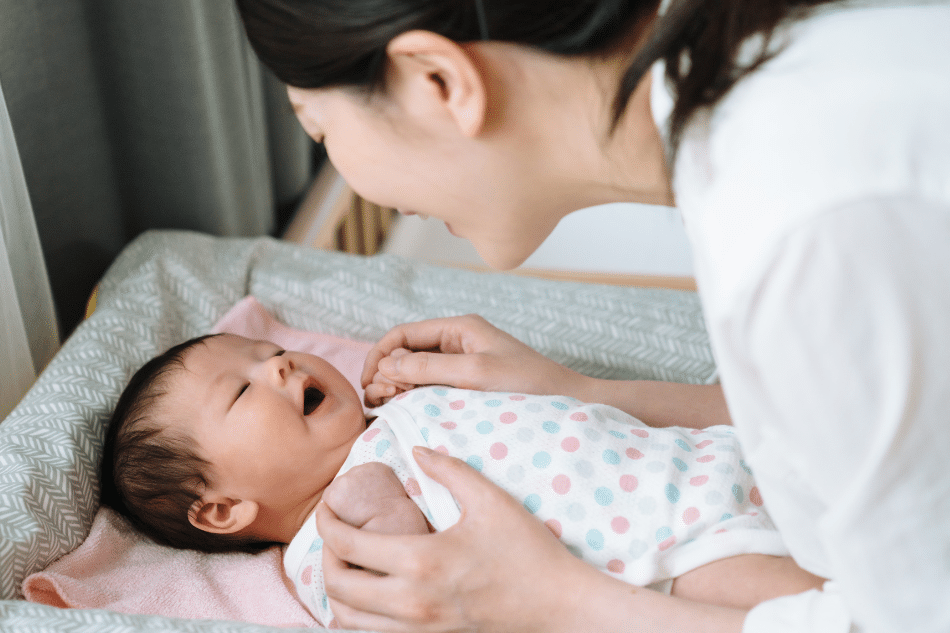
Reach Out to Mission Prep for Emergency Mental Health Care for Teen Moms
If you’re seeing signs that a teen might be struggling after childbirth, especially anything that feels confusing or out of character, it’s okay to trust that instinct. Postpartum psychosis can come on fast, and getting support early can make all the difference.
At Mission Prep, we offer immediate help for teen mothers in crisis. That includes mental health evaluations, care planning, hospitalization for teen postpartum psychosis, and help finding the right inpatient or outpatient support. Our team works with adolescents every day and understands how stress, trauma, and hormone shifts can affect the teen brain after birth.
If you’re a parent, teacher, or just someone who cares, we can also direct you toward the best mental health crisis resources for young moms. Give us a call. We’ll help you take the next step and make sure the right support is in place.
References
- Friedman, S. H., Reed, E., & Ross, N. E. (2023). Postpartum psychosis. Current Psychiatry Reports, 25(2), 65–72. https://pmc.ncbi.nlm.nih.gov/articles/PMC9838449/
- Kotla, R., Patil, P. S., & Ahluwalia, I. (2024). Postpartum psychosis as a precursor to schizophrenia: A comprehensive review. Cureus, 16(9), e68451. https://pmc.ncbi.nlm.nih.gov/articles/PMC11446226/#:~:text=The%20postpartum%20period%20is%20marked,already%20predisposed%20to%20mood%20disorders
- University College London (UCL). (2021, March 17). Analysis: Teenage mental health – how growing brains could explain emerging disorders. UCL News. https://www.ucl.ac.uk/news/2021/mar/analysis-teenage-mental-health-how-growing-brains-could-explain-emerging-disorders
- American Psychological Association. (n.d.-e). Postpartum depression. Retrieved June 19, 2025, from https://www.apa.org/topics/women-girls/postpartum-depression
- Sharma, V., Mazmanian, D., Palagini, L., & Bramante, A. (2022). Postpartum psychosis: Revisiting the phenomenology, nosology, and treatment. Journal of Affective Disorders Reports, 10, Article 100378. https://www.sciencedirect.com/science/article/pii/S2666915322000713
- Raza, S. K., & Raza, S. (2025). Postpartum psychosis. In StatPearls. StatPearls Publishing. https://www.ncbi.nlm.nih.gov/books/NBK544304/
- Agbor, C., Kaur, G., Soomro, F. M., Eche, V. C., Urhi, A., Ayisire, O. E., Kilanko, A., Babalola, F., Eze-Njoku, C., Adaralegbe, N. J., Aladum, B., Oyeleye-Adegbite, O., & Anugwom, G. O. (2022). The role of cognitive behavioral therapy in the management of psychosis. Cureus, 14(9), e28884. https://pmc.ncbi.nlm.nih.gov/articles/PMC9541382/#:~:text=CBT%20leads%20to%20a%20decrease,in%20individuals%20with%20persecutory%20delusions
- Forde, R., Peters, S., & Wittkowski, A. (2019). Psychological interventions for managing postpartum psychosis: A qualitative analysis of women’s and family members’ experiences and preferences. BMC Psychiatry, 19, Article 411. https://pmc.ncbi.nlm.nih.gov/articles/PMC6923990/#:~:text=Furthermore%2C%20families%20and%20partners%20have,and%20preferences%20for%20psychological%20intervention
- McLeish, J., Ayers, S., & McCourt, C. (2023). Community-based perinatal mental health peer support: A realist review. BMC Pregnancy and Childbirth, 23, Article 570. https://bmcpregnancychildbirth.biomedcentral.com/articles/10.1186/s12884-023-05843-8
- Mhango, W., Crowter, L., Michelson, D., & Gaysina, D. (2023). Psychoeducation as an active ingredient for interventions for perinatal depression and anxiety in youth: A mixed-method systematic literature review and lived experience synthesis. BJPsych Open, 10(1), e10. https://pmc.ncbi.nlm.nih.gov/articles/PMC10755556/

